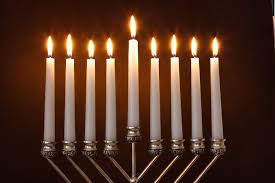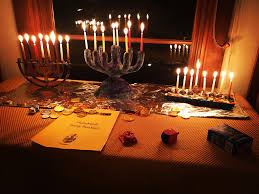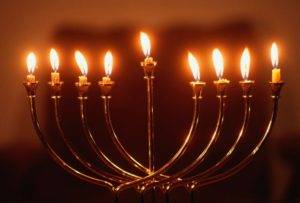How do you light the Chanukah Menorah?
As you can imagine , this was a discussion among the Rabbis. The Talmud famously pits the House of Shammai against the House of Hillel, our preeminent first pair of rabbis.
, this was a discussion among the Rabbis. The Talmud famously pits the House of Shammai against the House of Hillel, our preeminent first pair of rabbis.
Do you light one candle the first night and increase another candle every night until all are lit on the eighth day?
Or do you light all the candles on the First day and decrease the number until you reach one candle?
Most of us know Hillel won that argument, so we increase the light with every passing day.
 Do you use Applesauce or Sour Cream when you eat latkes? They never decided on this argument, so we do both! (actually, I am pretty sure they never engaged in this discussion- I am making it up)
Do you use Applesauce or Sour Cream when you eat latkes? They never decided on this argument, so we do both! (actually, I am pretty sure they never engaged in this discussion- I am making it up)
Do you light one Menorah for the family, or does everyone get to light their own?
 Did you know the Menorah we use for Chanukah is called a Chanukiah? (it is an eight-light, plus Shamash, candelabra as distinguished from the seven-armed menorah used in the Temple).
Did you know the Menorah we use for Chanukah is called a Chanukiah? (it is an eight-light, plus Shamash, candelabra as distinguished from the seven-armed menorah used in the Temple).
Do you put the menorah in your front window for the community to view?
Why do I always seem to lack the right number of candles?
And when I buy candles on sale after Chanukah, I can’t remember where I put them for the next year.
Last but not least, is it Chanukah, Hannukah, or Channukah, Hanukah, Hanukkah, etc.?
We can get all caught up in both the fun and serious questions as we determine how we want to celebrate our holiday. But remember it is about celebrating the holiday.
It is a time of celebration and rededication. We remember the story of Jewish victory, which instilled pride in our heritage and gave us strength and confidence as we face seemingly enormous challenges today. We spend time with our family, sharing the light’s glow, the pleasure of the food, and the fun of the games. May your Chanukah be wonderous!
Chag Urim Sameach, Happy Hanukah!

